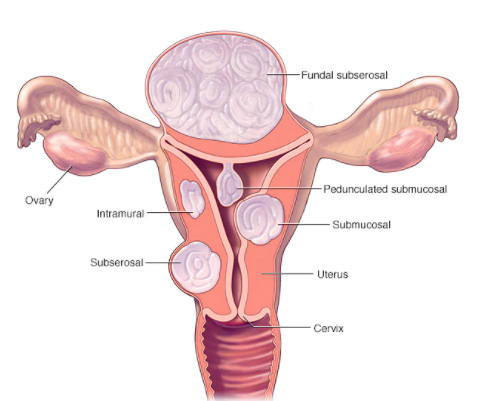
Fibroids are growths that develop inside the womb (uterus). They are usually noncancerous, and frequently present as more than a singular growth. As many as 1 in 5 women may have fibroids during their childbearing years, while half of all women have fibroids by the age of 50. The medical term for a fibroid is a uterine myoma.
Fibroids can cause problems and usually require treatment, but they are not mostly life-threatening. They often develop within the muscle wall of the womb but can also grow in other areas. The symptoms may be different depending on the site of the fibroid(s).
Very often, women have no symptoms and may not even know that they have fibroids. Symptoms are not necessarily related to the size or number of the fibroids, but usually, the bigger or more numerous they are, the more likely they are to cause problems. The most common symptom caused by fibroids is heavy, prolonged periods (menorrhagia). This heavy bleeding may cause some women to become anemic. Fibroids can cause the womb to become bulky and enlarged, causing pressure in the pelvic region. This can result in symptoms such as backache, lower abdominal pain, and the need to urinate more frequently. Fibroids may cause fertility problems in some women, particularly if the fibroids grow out into the womb and prevent an embryo from implanting.
It is not known what causes fibroids. High levels of estrogen may influence their growth, this is not the root cause. Fibroids can occur in women with children but are more common in women with lower fertility or those without children. Being very overweight may increase the risk of developing fibroids, however, slim women can also develop fibroids.
Once the diagnosis has been confirmed, the type of treatment recommended will depend on the symptoms being caused by the fibroids and on whether or not you wish to keep fertility intact.
If the main problem is heavy periods, then a hormone treatment may be prescribed. These treatments are usually given for six months. If you are nearing menopause, hormonal treatment is usually sufficient, as fibroids tend to shrink after menopause.
If hormone treatment is not sufficient to control the symptoms, then surgery may be advised. If you wish to remain fertile and conceive, you may elect to have the fibroids removed (myomectomy). If the fibroids are troublesome, big in size and you do not wish to have any more children, a hysterectomy (complete removal of the cervix and womb) may be performed. Depending on your age, the ovaries may or may not be removed at the same time.
If you are anaemic, hematinic supplements are also given.
Writer - Dr Guneeta Mehta Jain